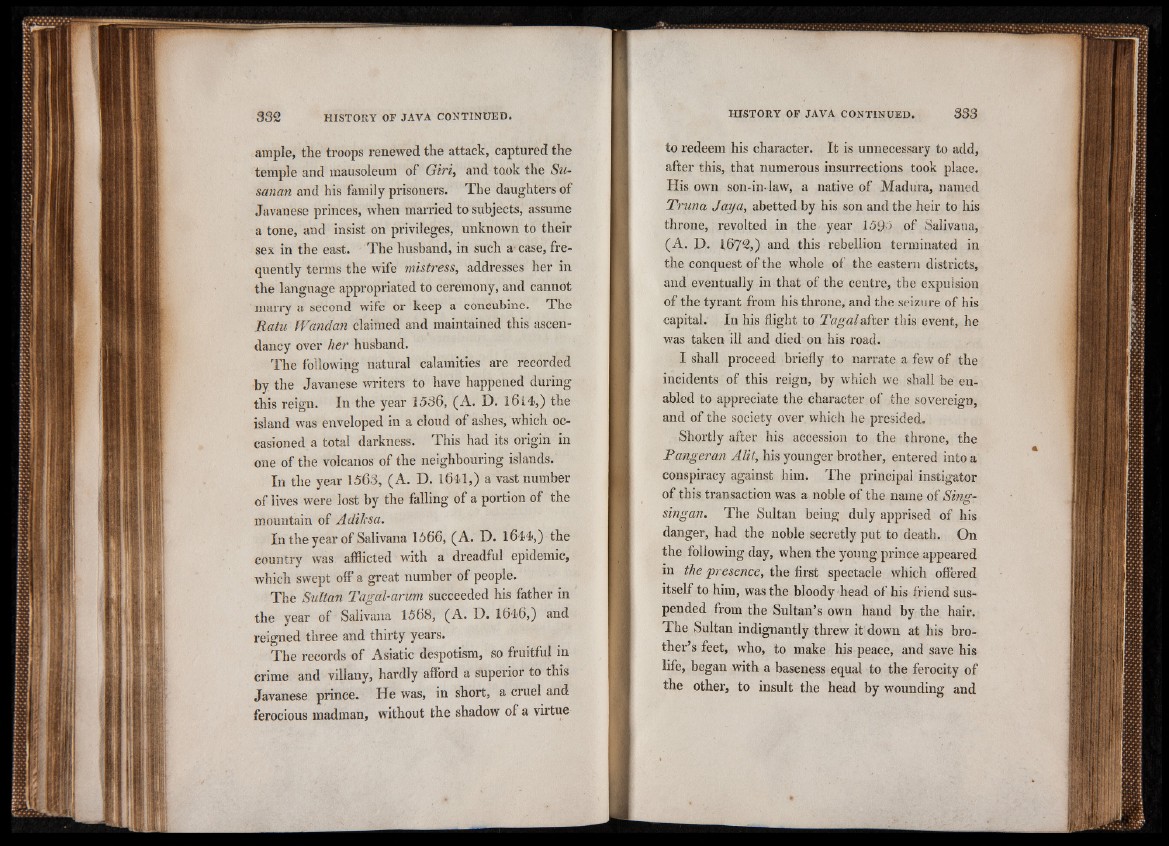
ample, the troops renewed the attack, captured the
temple and mausoleum of Giri, and took the Su-
sanan and his family prisoners. The daughters of
Javanese princes, when married to subjects, assume
a tone, and insist on privileges, unknown to their
sex in the east. The husband, in such a-case, frequently
terms the wife mistress, addresses her in
the language appropriated to ceremony, and cannot
marry a second wife or keep a concubine. The
Ratu Wandan claimed and maintained this ascendancy
over her husband.
The following natural calamities are recorded
by the Javanese writers to have happened during
this reign. In the year 1536, (A. D. 1614,) the
island was enveloped in a cloud of ashes, which occasioned
a total darkness. This had its origin in
one of the volcanos of the neighbouring islands.
In the year 1563, (A. D. 1641,) a vast number
of lives were lost by the falling of a portion of the
mountain of Adiksa.
In the year of Salivana 1566, (A. D. 1644,) the
country was afflicted with a dreadful epidemic,
which swept off a great number of people.
The Sultan Tagal-arum succeeded his father in
the year of Salivana 1568, (A. D. 1646,) and
reigned three and thirty years.
The records of Asiatic despotism, so fruitful in
crime and villany, hardly afford a superior to this
Javanese prince. He was, in short, a cruel and
ferocious madman, without the shadow of a virtue
to redeem his character. It is unnecessary to add,
after this, that numerous insurrections took place.
His own son-in-law, a native of Madura, named
Truna Jay a, abetted by his son and the heir to his
throne, revolted in the year 1595 of Salivana,
(A. D. I672,) and this rebellion terminated in
the conquest of the whole of the eastern districts,
and eventually in that of the centre, the expulsion
of the tyrant from his throne, and the seizure of his
capital. In his flight to Tagal after this event, he
was taken ill and died on his road.
I shall proceed briefly to narrate a few of the
incidents of this reign, by which we shall be enabled
to appreciate the character of the sovereign,
and of the society over which he presided.
Shortly after his accession to the throne, the
Pangeran Alit, his younger brother, entered into a
conspiracy against him. The principal instigator
of this transaction was a noble of the name of Sins-
singan. The Sultan being duly apprised of his
danger, had the noble secretly put to death. On
the following day, when the young prince appeared
in the presence, the first spectacle which offered
itself to him, was the bloody head of his friend suspended
from the Sultan’s own hand by the hair.
The Sultan indignantly threw it down at his brother’s
feet, who, to make his peace, and save his
life, began with a baseness equal to the ferocity of
the other, to insult the head by wounding and